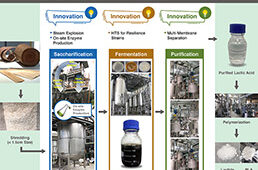Lawrence Berkeley National Laboratory (Berkeley Lab)
researchers will play roles in three new energy research projects being funded
by the U.S. Department of Energy (DOE)’s Advanced Research Projects
Agency-Energy (ARPA-E) that are aimed at “dramatically improving U.S.
production and use of energy.” These three projects entail the development of
tobacco as a source of biofuels, creation of a personalized system for reducing
customer demands for electrical power when the grid is congested, and
development of a commercial process for extracting biofuels from the resin of
pine trees.
On September 29, 2011, ARPA-E director Arun
Majumdar announced 60 new projects to be funded at an approximate total of $156
million.
“These innovative projects are at the forefront of
a new technological frontier that plays a critical role in our future energy
security and economic growth,” Majumdar says. “It is now more important than
ever to invest in game-changing ideas that will build the technological
infrastructure for a new, clean energy economy.”
Says Berkeley Lab director Paul Alivisatos, “Berkeley Lab is proud to be involved in these three ARPA-E projects, all of
which have the potential to create economic growth and jobs, and a sustainable
energy future.”
Christer Jansson, a biochemist with Berkeley Lab’s
Earth Sciences Division, heads a group that will receive about $4.9 million to
engineer tobacco plants to produce molecules in their leaves that can be used
as high-density liquid transportation fuels. The goals are to introduce genetic
traits, some from cyanobacteria and green algae, that will confer hydrocarbon
biosynthesis, enhance carbon uptake, and optimize the plant’s utilization of
sunlight. Advanced cultivation techniques will also be deployed to maximize
biomass.
Mary Ann Piette, a mechanical engineer with
Berkeley Lab’s Environmental Energy Technologies Division (EETD) who directs
research at the Demand Response Research
Center, is the co-principal
investigator, along with David Watson, also of EETD, on a partnership with
AutoGrid Inc., a company that provides software analytics for the Smart Grid,
and Columbia University. This partnership is to
receive about $3.5 million to design and demonstrate a highly distributed
Demand Response Optimization and Management System for Real-Time (DROMSRT). The
goal is to enable “personalized” price signals to be sent to millions of
electrical power customers in extremely short timeframes, enabling those
customers to reduce their demand when the grid is congested. DROMS-RT is expected
to provide a 90% reduction in the cost of operating demand response programs in
the United States.
Jay Keasling and Blake Simmons are the co-principal
investigators on behalf of the Joint BioEnergy Institute (JBEI), which is
working in partnership with researchers at the University of Florida
on a project that is to receive nearly $6.4 million for developing the
commercial production of terpene biofuels in pine trees. Terpenes are a large
class of chemical compounds produced in plants, especially conifers, that have
promising potential as biofuels. In this project, a pine tree will be
engineered to increase production of turpentine, a natural liquid biofuel, by
about six-fold. The tree will also be engineered to increase the turpentine
storage capacity of its wood. The goal is produce 100 million gallons of
sustainable domestic biofuel fuel per year from less than 25,000 acres of
forestland. JBEI is one of three DOE
Bioenergy Research
Centers and a
multi-institutional partnership led by Berkeley Lab.




